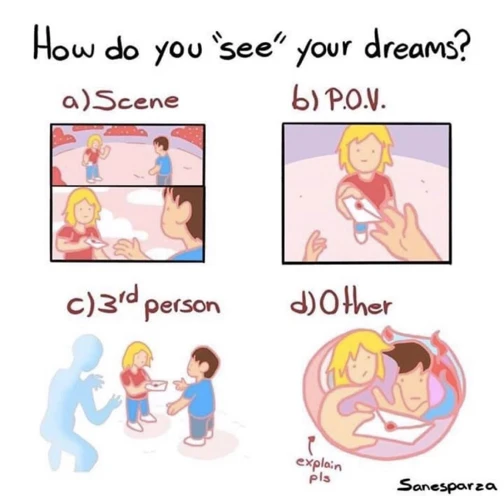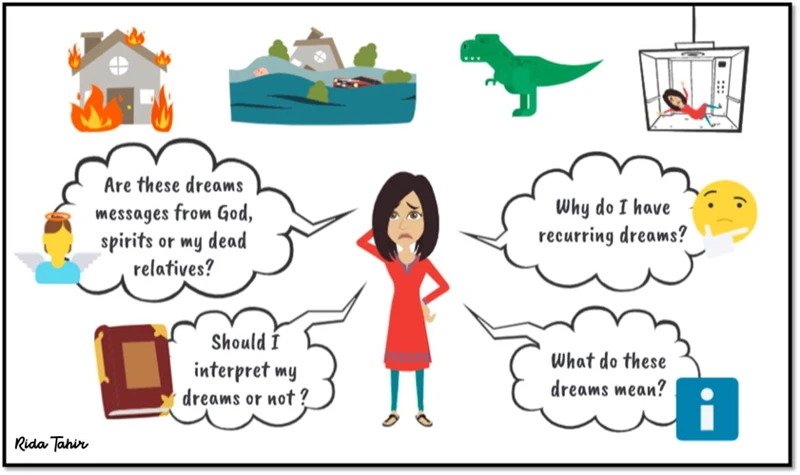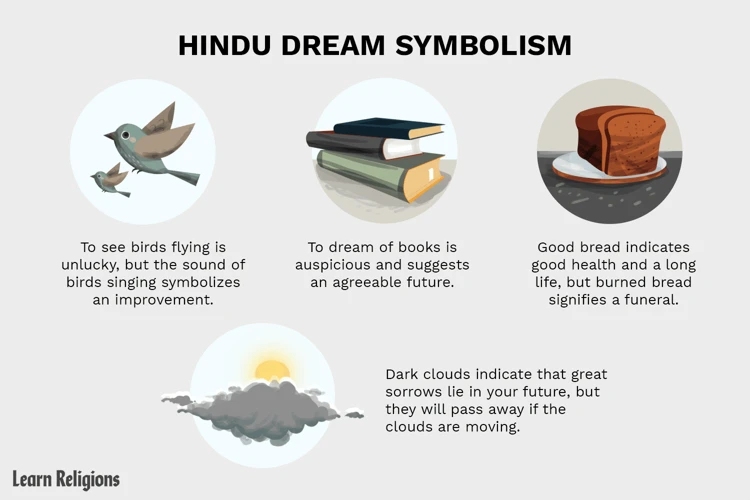Have you ever experienced the curious sensation of dreaming in third person? The feeling of watching yourself from a distance, as if you were an outsider observing your own life unfold? This type of dreaming, known as third person dreaming, has long fascinated psychologists, spiritualists, and dream enthusiasts alike. In this article, we will delve into the meaning and symbolism behind dreaming in the third person, exploring its possible interpretations and shedding light on the common scenarios that occur in these dreams. So, grab your notepad and prepare to unravel the mysteries that lie within the realm of third person dreaming.
What is Dreaming in Third Person?

Dreaming in third person refers to the experience of observing oneself and the events in a dream as an external observer, rather than experiencing them from a first-person perspective. In these dreams, you may see yourself from a distance, as if watching a movie or a scene play out. It can be a perplexing experience, as it creates a sense of detachment and objectivity. The concept of dreaming in third person has garnered interest from various fields, including psychology and spirituality. Psychologists theorize that these dreams provide insights into the dreamer’s self-perception and relationships, while spiritualists believe they may hold deeper symbolic meanings. Exploring the symbolism and interpretation of dreaming in third person can offer valuable insights into the intricacies of the dream world.
- Observing the Self
- Disconnection and Objectivity
- Perspective and Empathy
Symbolism of Dreaming in Third Person

Dreaming in third person holds significant symbolism that can provide valuable insights into the dreamer’s subconscious mind. One interpretation of this dream phenomenon is that it represents the act of observing oneself, offering a unique perspective on self-reflection and introspection. It allows individuals to detach themselves from their own emotions and biases, enabling a more objective view of their thoughts, actions, and relationships. Dreaming in the third person can also symbolize a sense of disconnection, highlighting feelings of detachment from one’s own experiences or a need for emotional distance. This perspective can foster empathy and understanding towards others, as it allows individuals to view situations from an outsider’s point of view. By exploring the symbolism of dreaming in the third person, we can gain a deeper understanding of ourselves and the intricate workings of our subconscious mind.
Observing the Self
Observing the self is a key aspect of dreaming in the third person. It involves the experience of seeing oneself from an external perspective, as if watching a movie or observing a scene unfold. This unique vantage point allows individuals to gain insights into their own behaviors, personality traits, and emotions without the filters of self-bias. By witnessing oneself as a separate entity, it offers an opportunity for self-reflection and introspection. It can also provide a symbolic representation of the dreamer’s relationship with themselves and their understanding of their own identity. Understanding the significance of observing oneself in dreams can contribute to a deeper understanding of one’s subconscious mind.
Dreaming about teeth falling out is another intriguing dream symbol that often carries important symbolic meanings. However, it is not directly related to the topic of observing oneself in third person dreams.
Disconnection and Objectivity
The experience of disconnection and objectivity in dreaming in third person is a notable aspect. In these dreams, the dreamer may feel emotionally distant from the events and characters involved. This sense of detachment can create a space for greater objectivity and observation. The dreamer becomes an outsider, gaining a unique perspective and insight into their own lives. This detachment allows for a broader understanding of situations and relationships, as the dreamer can see the bigger picture without being overwhelmed by personal biases or emotions. It creates an opportunity for self-reflection and a deeper exploration of one’s thoughts, feelings, and behaviors. The symbolism behind this disconnection and objectivity in third person dreams can provide valuable insights into the dreamer’s inner world and personal growth.
/source
Perspective and Empathy
In the context of dreaming in third person, perspective and empathy play a significant role. When we dream in the third person, we have the unique opportunity to step outside of ourselves and view situations from a different vantage point. This detached perspective allows us to gain a deeper understanding of our own emotions and behaviors, as well as those of others. It can foster empathy as we observe the interactions and experiences of the dream characters. This perspective shift can be enlightening, as it provides an outside view of our own lives and relationships. Through dreaming in the third person, we may develop a greater sense of empathy and a heightened awareness of the complexities of human interactions and emotions.
- Observing the Self
- Disconnection and Objectivity
Interpretation of Dreaming in Third Person

Dreaming in the third person can hold significant interpretation and meaning. One possible interpretation is that these dreams reflect a reflective state where the dreamer is able to detach and observe their relationships from an outside perspective. It provides an opportunity for the dreamer to reflect on their interactions and dynamics with others in a more objective manner. Additionally, dreaming in third person can also indicate a journey of personal growth and self-discovery, as the dreamer explores different perspectives and gains insights into their own thoughts and behaviors. These dreams can also be a manifestation of repressed emotions and inner conflicts, allowing the dreamer to confront and resolve these unresolved issues. Exploring the interpretation of dreaming in the third person can offer valuable insights into the complexities of the subconscious mind and the potential for personal development and healing.
Have you ever wondered about the meaning of seeing a fox in your dreams?
Reflection on Relationships
Reflection on relationships is a significant aspect of interpreting dreams in the third person. When you observe yourself and others from an external vantage point, it allows for a unique perspective on your interactions and connections with others. These dreams may bring to light the dynamics and emotions within your relationships, providing an opportunity for introspection and understanding. It allows you to analyze your behavior, reactions, and the overall dynamics of your relationships from a more objective standpoint. This self-reflection can offer valuable insights and potentially lead to personal growth. Exploring the depths of these dreams and their reflection on relationships can provide a deeper understanding of ourselves and our connections with others.
Exploring Personal Growth
Exploring personal growth is another significant aspect when considering the interpretation of dreaming in the third person. These dreams often provide an opportunity for introspection and self-reflection. By observing oneself from an outside perspective, individuals can gain valuable insights into their own behaviors, habits, and emotions, allowing for personal growth and development. This detached viewpoint allows for a deeper understanding of one’s actions and how they may impact others. It can serve as a catalyst for personal transformation and the pursuit of self-improvement. By delving into the symbolism and messages within these dreams, individuals can unravel hidden aspects of themselves and embark on a journey of self-discovery.
- Reflection on Relationships
- Exploring Personal Growth
- Repressed Emotions and Inner Conflict
Repressed Emotions and Inner Conflict
Repressed emotions and inner conflict often surface in dreams experienced in the third person. When you dream in the third person, it allows for a degree of objectivity and distance from the events unfolding. This can create a space for repressed emotions and unresolved inner conflicts to manifest symbolically. You may observe characters representing different aspects of yourself, engaging in scenarios that reflect your hidden emotions and unresolved conflicts. These dreams serve as an opportunity for self-reflection and exploring the deeper layers of your psyche. By examining the symbolism and messages within these dreams, you can gain valuable insights into your emotional state and work towards healing and resolution.
For more information on the spiritual meaning of a broken bed in dreams, click here.
Common Scenarios in Third Person Dreams

In third person dreams, there are several common scenarios that often occur, adding to the intrigue of these experiences. One of these scenarios is watching scenes unfold, like an observer witnessing a story as it plays out. Another common scenario is being an outside observer, seeing yourself and others from a detached perspective. Additionally, some individuals may find themselves in the unique position of controlling multiple characters within the dream, navigating the dream landscape and influencing the actions of different individuals. These recurring scenarios in third person dreams add a layer of complexity and variation to the dreamer’s experience, further fueling the fascination with this unique dream phenomenon.
- Watching Scenes Unfold
- Being an Outside Observer
- Controlling Multiple Characters
Watching Scenes Unfold
Watching scenes unfold is a common scenario in dreams where you are experiencing them in third person. In these dreams, you may find yourself observing events and situations as if you were watching a movie or a play. This perspective allows you to witness the interactions and dynamics between characters from an external viewpoint. It can be a perplexing experience as you are not actively participating in the dream but rather passively observing. This type of dream may reflect a desire for objectivity and detachment in certain aspects of your life, allowing you to gain a deeper understanding of the events and relationships depicted in the dream. It can also signify a need for reflection and contemplation on the unfolding scenes to gain insights and perspectives that may not be immediately apparent in your waking life.
Being an Outside Observer
Being an outside observer in a third person dream means witnessing the dream’s events and characters as if you are watching a movie or a scene unfold. In these dreams, you are not actively participating or engaging in the events, but rather observing them from a distance. This perspective can create a sense of detachment, objectivity, and even a feeling of being disconnected from the dream itself. As an outside observer, you may have a unique vantage point to gain insights into the dynamics of the dream and the relationships between the dream characters. This role of being an outside observer can foster a sense of objectivity and allow you to explore different perspectives, cultivating empathy and understanding. It is a fascinating experience that holds valuable symbolism and interpretations within the realm of dreams.
Controlling Multiple Characters
Controlling multiple characters is a common scenario that can occur in dreams where the dreamer is experiencing the dream in the third person. In these dreams, you may find yourself not only observing the events unfold but also having the ability to control and navigate through multiple characters within the dream. This can be an incredibly intriguing and, at times, confusing experience, as you switch between different perspectives and embody various individuals. The ability to control multiple characters in a dream can signify a sense of versatility, adaptability, or even a desire to explore different aspects of oneself. It may also reflect the dreamer’s ability to see situations from multiple angles or empathize with different perspectives. This dream scenario can provide valuable insights into the dreamer’s psychological and emotional state, as well as their interpersonal dynamics with others.
Psychological and Spiritual Analysis

Psychological and spiritual analysis provides valuable perspectives when it comes to understanding the significance of dreaming in third person. From a psychological standpoint, renowned theorists such as Freud and Jung offer insights into the underlying meanings of these dreams. Freud believed that dreaming in the third person reflects a dissociation from one’s own emotions or experiences, while Jung saw it as a representation of aspects of the unconscious self. On the spiritual side, dream analysis delves into metaphysical interpretations, exploring the idea that third person dreams may be glimpses into alternate realities or spiritual dimensions. Additionally, the practice of lucid dreaming and astral projection is often associated with the ability to consciously explore dreams in the third person, opening up possibilities for self-discovery and spiritual growth.
- Freudian and Jungian Perspectives
- Metaphysical Interpretations
- Lucid Dreaming and Astral Projection
Freudian and Jungian Perspectives
Freudian and Jungian perspectives provide valuable insights into the interpretation of dreaming in third person. According to Sigmund Freud, dreams are a representation of unconscious desires and wishes, and dreaming in third person may indicate a level of objectivity and detachment from these desires. It could symbolize the dreamer’s need for self-reflection and exploration of repressed emotions. On the other hand, Carl Jung believed that dreams connect individuals to the collective unconscious, and dreaming in third person may suggest a deeper connection to the world and a heightened sense of empathy. It can serve as a pathway to understanding archetypal patterns and universal symbolism. Both Freudian and Jungian perspectives offer unique lenses through which to analyze and interpret the meaning of dreaming in the third person.
- Representation of unconscious desires and wishes
- Objectivity and detachment
- Self-reflection and exploration
- Connection to collective unconscious
- Heightened sense of empathy
- Archetypal patterns and symbolism
Metaphysical Interpretations
Metaphysical interpretations of dreaming in third person delve into the spiritual and esoteric aspects of these dreams. According to metaphysical beliefs, dreaming in third person can be seen as a reflection of the dreamer’s ability to detach from their ego and gain a broader perspective. It may indicate a heightened level of consciousness and access to higher realms of existence. Some metaphysical interpretations suggest that dreaming in third person is a sign of spiritual growth and development, as it represents the expansion of one’s awareness beyond the limitations of the individual self. This perspective encourages individuals to explore the connection between their dreams and their spiritual journey, inviting them to delve deeper into the mysterious realms of the subconscious mind.
- Expanded Consciousness
- Transcendence of Ego
- Spiritual Growth and Development
Lucid Dreaming and Astral Projection
Lucid dreaming and astral projection are two fascinating phenomena that are often associated with the experience of dreaming in third person. In lucid dreaming, the dreamer becomes aware that they are dreaming and gains control over the dream narrative. This heightened awareness can sometimes lead to a third person perspective within the dream, as the dreamer can observe themselves and the dream scenario from an external viewpoint. Astral projection, on the other hand, is the belief or practice of intentionally separating one’s consciousness or spirit from the physical body and exploring different realms or dimensions. Some individuals claim to have had out-of-body experiences during astral projection where they perceive themselves from a third person perspective, as though they are floating or hovering above their own body. These intriguing connections between dreaming in third person, lucid dreaming, and astral projection highlight the complex and mystical nature of the dream realm.
- Lucid Dreaming and Control
- Out-of-Body Experiences
- Exploration of Other Realms
Tips for Deeper Understanding
To gain a deeper understanding of your dreams in third person, consider incorporating these tips into your exploration. Keeping a dream journal can help you record and analyze your dreams, allowing you to identify patterns and themes over time. Reflecting on emotional resonance is another important aspect, as it can reveal underlying emotions and subconscious messages within your dreams. Additionally, seeking professional guidance from psychologists, therapists, or dream experts can provide valuable insights and interpretations. Remember that dreams are highly personal, and what may hold significance for one person may differ for another. Embrace the mystery and enjoy the journey of unraveling the hidden meanings within your dreams.
Keep a Dream Journal
Keeping a dream journal is an effective practice for gaining a deeper understanding of dreams experienced in the third person. By recording your dreams in a journal regularly and in detail, you can capture the nuances and symbols that arise in this unique dreaming perspective. Include specific details such as locations, characters, and emotions felt during the dream. Reflecting on your dream journal entries can help identify patterns, symbols, and recurring themes that may unfold in your third person dreams, providing valuable insights into your subconscious mind. Additionally, reviewing your dream journal over time may reveal connections between different dreams and unveil hidden meanings. So, grab a notebook, keep it by your bedside, and make it a habit to document your third person dreams.
Reflect on Emotional Resonance
Reflecting on the emotional resonance of your dreams can provide valuable insights into the meaning of dreaming in the third person. Pay attention to the emotions you experienced during the dream and how they may relate to your waking life. Did you feel disconnected or indifferent as an observer? Or did you feel empathy and connection towards the characters and events in the dream? Note any strong emotions or recurring themes that stood out to you, as they may hold clues to unresolved emotions or hidden desires. By delving into the emotional resonance of your dreams, you can gain a deeper understanding of yourself and the underlying messages that your subconscious is trying to communicate.
- Pay attention to emotions
- Note recurring themes
- Uncover hidden desires
Seek Professional Guidance
If you find that your dreams in third person consistently evoke strong emotions, confusion, or distress, seeking professional guidance can be beneficial. Consulting with a therapist or dream analyst who specializes in dream interpretation can provide valuable insight into the deeper meanings and significance of your dreams. These professionals can help you explore the symbolism and themes present in your dreams, assisting you in gaining a deeper understanding of yourself and your subconscious mind. Their expertise can offer guidance in navigating any unresolved issues, repressed emotions, or personal conflicts that may arise from your third person dreams. Remember, professional guidance can provide the necessary support and tools for unlocking the hidden messages and potential growth within your dreams.
Conclusion
In conclusion, dreaming in third person is a fascinating phenomenon that offers unique insights into our subconscious minds. Through the symbolism and interpretation of these dreams, we can gain a deeper understanding of our relationships, personal growth, and inner conflicts. It is important to keep in mind that each dream is highly personal and subjective, and the meanings may vary from individual to individual. Keeping a dream journal, reflecting on emotional resonance, and seeking professional guidance can all aid in deepening our understanding of these dreams. So, embrace the enigmatic nature of third person dreaming, and let the symbols and messages within these dreams guide you towards self-discovery and personal transformation.
Frequently Asked Questions
1. Can everyone experience dreaming in third person?
Dreaming in third person is a phenomenon that can be experienced by anyone. However, not everyone may recall their dreams or have dreams in third person frequently.
2. What could be the possible reasons for dreaming in third person?
There are various reasons why someone may dream in third person. It could be influenced by the individual’s personality traits, the events happening in their life, or the subconscious mind processing emotions and experiences.
3. Are there any potential psychological implications of dreaming in third person?
Psychologists suggest that dreaming in third person can provide valuable insights into the dreamer’s self-perception, relationships, and emotions. It may reflect a sense of detachment or objectivity in their waking life.
4. Can dreaming in third person have spiritual significance?
Some spiritualists believe that dreaming in third person holds symbolic meaning beyond the psychological aspect. They interpret it as a way for the subconscious mind to communicate with the conscious self or as a spiritual journey of self-discovery.
5. Are there any common themes or scenarios in third person dreams?
Common scenarios in third person dreams include watching scenes unfold as an observer, being an outside observer in unfamiliar situations, or even controlling multiple characters within the dream.
6. Is there a difference between dreaming in third person and astral projection?
Dreaming in third person is distinct from astral projection. Astral projection refers to the belief that the soul leaves the physical body and travels to different realms or dimensions. Whereas dreaming in third person involves observing oneself within the dream without actually leaving the body.
7. How can I interpret the meaning of my third person dreams?
Interpreting the meaning of third person dreams can be subjective, as it depends on the individual’s personal experiences and emotions. Keeping a dream journal, reflecting on emotional resonance, and seeking guidance from professionals can help deepen the understanding of these dreams.
8. Are there any cultural or historical references to dreaming in third person?
Dreams have been a topic of fascination in various cultures throughout history. Some ancient societies believed that dreaming in third person was a way to communicate with spirits, while others associated it with visionary experiences or divine messages.
9. Can dreaming in third person be influenced by external factors?
External factors such as stress, trauma, or significant life events can impact the content and frequency of dreams, including dreaming in third person. Keeping track of these factors and their correlations with third person dreams may provide additional insights into their meaning.
10. Are there any techniques to induce or control dreaming in third person?
While there are no guaranteed techniques to induce or control specific dream perspectives, practicing lucid dreaming techniques and developing a heightened awareness of one’s dreams may increase the likelihood of experiencing and exploring third person dreams.








